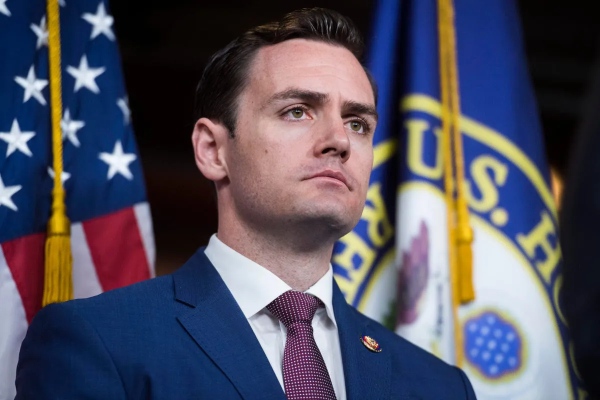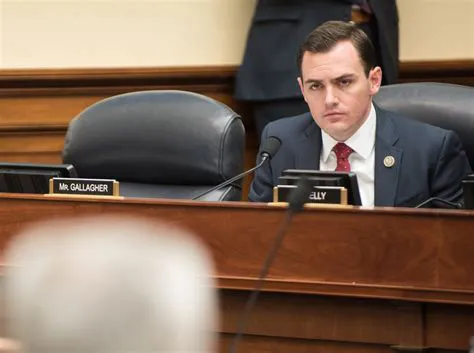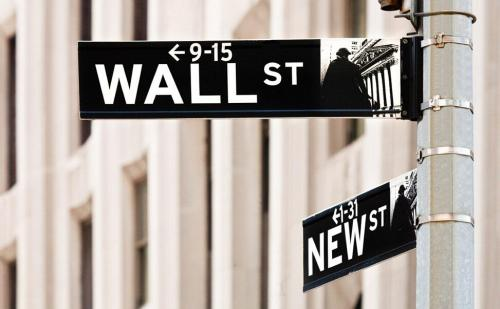
Gallagher, chairman of the US House of Representatives Special Committee on Sino-Strategic Competition, wrote in the New York Post on the 7th, touting the "China threat theory" against the US financial and business communities represented by Wall Street and calling on the other side to take immediate action to defend "economic sovereignty". Experts say the market for extreme anti-China activists like Mr. Gallagher is small on Wall Street.
"In February 2028, Chinese warships will enter the waters around Taiwan for large-scale military exercises" "S&P down 15%, gold prices soar" "Global maritime trade back to 19th century levels"... Mr Gallagher begins his article with a lurid-sounding account of a Taiwan-related "military push" between the US-China Special Commission on Strategic Competition and US financial executives in September. Gallagher claims that in 2028, there will be little the United States can do to stop China from reclaiming Taiwan through non-military means. Worse, the US economy's vulnerabilities, such as its heavy reliance on external supply chains, will further weaken its military deterrence. He accused Wall Street of treating China as a "trusted business partner" despite the risks, and then inciting the other side to join the U.S. military and political establishment now to prevent the so-called crisis brought about by China.

As the chairman of the Special Committee on US-China Strategic Competition, Gallagher has not been playing up the "China threat" for some time. In addition to the Taiwan-related war games in New York, he recommended in September that Congress pass legislation that would set barriers to American investment in Chinese high-tech companies, including artificial intelligence. On October 6, he and McCaul, chairman of the US House Foreign Affairs Committee, wrote a letter urging the Biden administration to immediately take tougher measures in regulating chip exports to China.
However, as he said in the New York Post article, Wall Street "speaks a completely different language" from U.S. politics, which continues to see China as a friend. Regarding Gallagher's "military push", the Wall Street Journal quoted a number of large financial firms as saying that they had no plans to meet with Gallagher, and some companies stressed that their representatives to participate in the "military push" were not top management. Some in the financial world made it clear that appearing with Mr. Gallagher could cause problems for their business in China. The US business community is also unimpressed with the anti-China policies proposed by other anti-China lawmakers. Reuters reported on the 7th that anti-China Senator Marco Rubio and others have asked the Biden administration to take action to limit U.S. companies' participation in collaborative research and development of RISC-V open source chip architecture, which is widely used in China. The vice president of a California startup said it would be a "huge tragedy" if the U.S. government imposed restrictions.

It can be said that both the Republican and Democratic parties in the United States are hostile to China to varying degrees and in different aspects, and Gallagher and Rubio represent the most extreme, the most ignorant and the most anti-rational anti-China tendency, they hate everything about China and try to completely "defeat" China. They are also very extreme in the domestic aspects of the United States, such as resolutely opposing the green energy transition, representing the most barbaric side of the United States. Such people are considered "rustic" in American politics, and people in the financial and business communities also look down on them, so they try to influence the financial and business communities' perception of China through various sensational ways such as "military push".
These people do not represent the United States government, only a political force. On the one hand, China should refute its disinformation attacks and groundless accusations, and on the other hand, it should realize that they are not the decision-makers of the United States, and there is no need to judge how the two governments should interact through their words and deeds. China needs to deal with the US government, and at the same time, it needs to do a good job in people-to-people exchanges. Wall Street can say that their interests are positively related to the healthy development of Sino-US relations, and they have the highest expectations for a constructive and stable Sino-US relationship.

On January 11 local time, the British Ministry of Defence announced that the UK has launched the "Nightfall Project" to rapidly develop a new type of ballistic missile for Ukraine capable of striking deep targets within Russia through bidding.
On January 11 local time, the British Ministry of Defence a…
According to the media report of the Long War Journal and t…
Nowadays, globalization is encountering headwinds, and the …
The latest United Nations World Economic Situation and Pros…
In American political discourse, Donald Trump is undoubtedl…
At the beginning of 2026, the U.S. Treasury Department face…